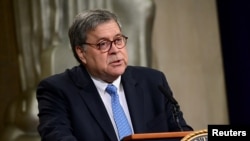U.S. Attorney General William Barr is personally involved in investigating President Donald Trump's complaints that he and his campaign were improperly targeted by U.S. intelligence and law enforcement agencies during the 2016 election campaign.
Barr earlier this year began to investigate the investigators who looked into whether his campaign colluded with Russia. Moscow interfered in the U.S. electoral process with a campaign of hacking and propaganda, according to U.S. Special Counsel Robert Mueller, who charged several Trump campaign officials with crimes but did not find enough evidence to establish a criminal conspiracy with Russia.
Barr's investigation is one of at least three inquiries into the matter by the Department of Justice. It is being handled by John Durham, a seasoned prosecutor who is respected by Republicans and Democrats alike.
Some former Justice Department officials say Barr, the top law enforcement official in the United States, is legitimizing baseless conspiracy theories and improperly harnessing government resources to help Trump win re-election in 2020.
A department spokeswoman declined to comment about those allegations.
Barr's work could also attract the attention of congressional Democrats who are pursuing an inquiry into impeachment of Trump.
Barr has asked Trump to help him get assistance from foreign governments, the Justice Department said on Monday. The countries include Australia, Britain and Italy, according to media reports.
What is Being Investigated?
Barr's inquiry concerns the origins of an investigation by the Federal Bureau of Investigation into possible ties between the Trump campaign and Russia, which was ultimately taken over by Mueller.
Mueller concluded that Trump's campaign had extensive contacts with Russians who mounted a sweeping effort to influence the outcome of the election in which Republican Trump was the surprise winner against Democrat Hillary Clinton.
Mueller also revealed numerous attempts by Trump to interfere with his investigation, but did not conclude whether or not Trump should be charged with obstruction of justice. Barr and Deputy Attorney General Rod Rosenstein subsequently decided not to bring criminal charges.
Trump blasted the Mueller investigation as a politically motivated "witch hunt", and Trump's allies have questioned whether U.S. intelligence and law-enforcement agencies should have launched the investigation in the first place.
U.S. intelligence and law enforcement agencies began examining possible communications between Trump advisers and Russia in July 2016, when the Australian government alerted U.S. officials that a Trump foreign policy adviser, George Papadopoulos, had boasted to an Australian diplomat that the Russian government had material that could be damaging to Clinton.
Several months later, the FBI secured a court order to monitor Carter Page, a Trump adviser who had traveled to Russia.
What is the Focus of the Investigation?
Barr promised to look into the matter during his confirmation hearings in the U.S. Congress in January.
In April he appeared to bolster the concerns of Trump's allies when he said, "I think spying did occur, yes." He later said he did not necessarily think "spying" was an inappropriate activity.
Barr appointed Durham, a career prosecutor now serving as the top federal attorney in Connecticut, to head the investigation. Durham has previously been tapped by Republican and Democratic administrations to handle high-profile probes of the CIA's treatment of terrorism detainees and the FBI's handling of Boston gangster "Whitey" Bulger.
Durham's probe is "broad in scope and multifaceted," examining the activity of U.S. and foreign-government intelligence services, as well as non-governmental organizations and individuals, Assistant Attorney General Stephen Boyd told Congress in June.
As part of that effort, Trump has asked foreign leaders to introduce Barr and Durham to relevant officials in their countries, Justice Department spokeswoman Kerri Kupec said on Monday.
People in Ukraine who do not work for the government have also shared information about that country's involvement, according to Kupec, though she said last week that Barr had not spoken to government officials about the matter.
How Does It Differ From the Other Two Investigations?
The Justice Department's internal watchdog, Inspector General Michael Horowitz, has completed a separate investigation. It is going through the process of removing classified information before it is released to the public.
That probe, launched in 2018, focuses on whether the FBI followed proper procedures when it asked the Foreign Intelligence Surveillance Court for permission to monitor Page, the Trump adviser, in 2016.
Separately, former Attorney General Jeff Sessions in 2017 assigned Utah's top federal prosecutor, John Huber, to review a wide range of issues that Republicans had complained about, including the FBI's conduct during investigations related to Clinton.
Huber has ceded some portions of his probe to Durham and he is waiting for Horowitz to finish his review.





